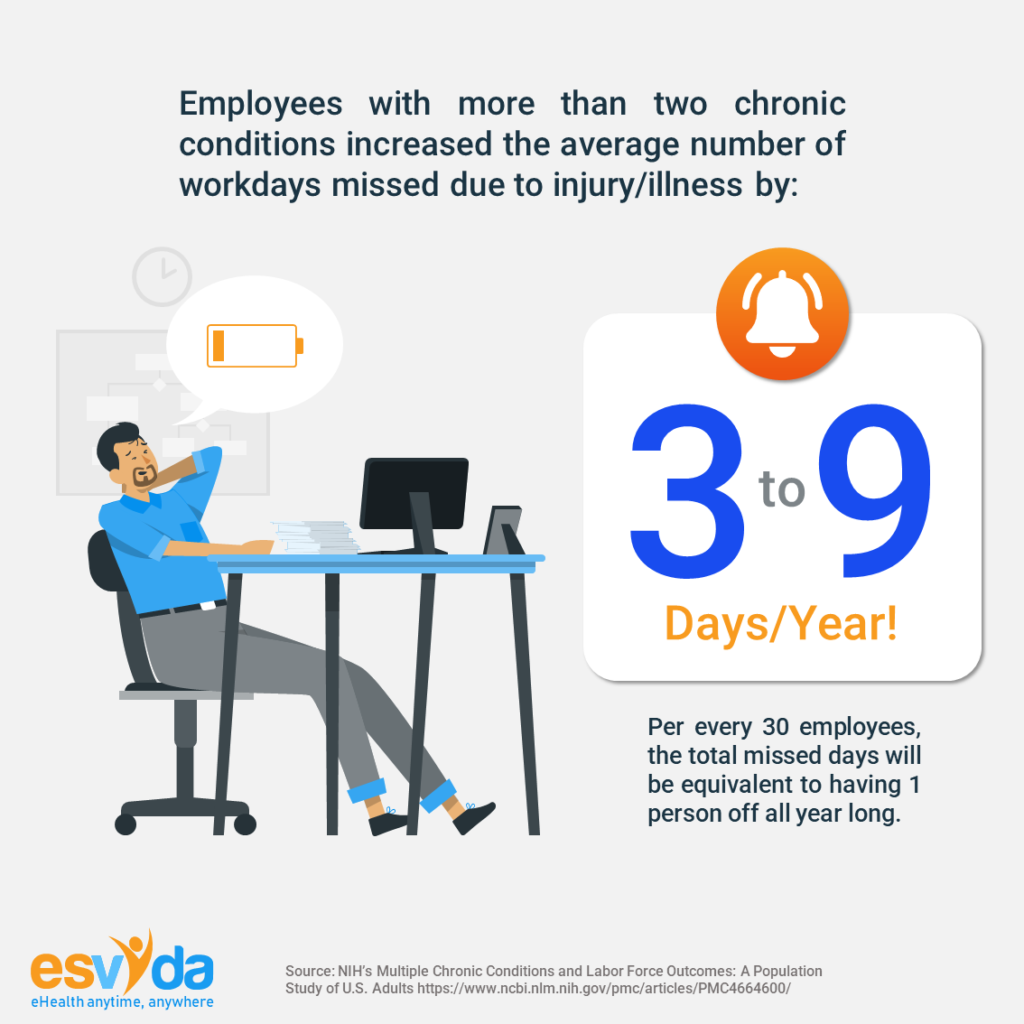In the US, 1-in-5 adults have more than two chronic conditions. However, limited employers’ attention has been given to the association between them and working. Employees are the backbone of an organization’s activity and growth. Therefore, promoting higher health of employees ensures that productivity remains at satisfactory levels.
Chronic diseases represent a danger to employees and a concern for employers since outcomes depend directly on healthy personnel. Reducing the impact of chronic diseases is a major research topic today between health care and technology companies. All, trying to find profitable and valuable solutions to improve companies’ earnings by bettering employee health and quality of life. This, however, requires that the healthcare system aids a preventive model over the current curative model.
A “preventive model” means bringing health care attention directly to the employee before developing a chronic disease related to work. Or, for employees that have preexisting conditions, means close monitoring of their health status. The “preventive model” focuses on following up on health behaviors to detect costly episodes and prevent them.
How employers can improve employee health?
This is where Remote Patient Monitoring (RPM) comes to play. Monitoring devices are required by users to perform “On the go” and optimize power consumption. Thus, new-generation devices are showing up with the capacity of transmitting measurements anytime and anywhere. Also, these devices should be made for embedding health monitoring functionalities into employees’ work routines without interrupting their work. Moreover, integrating with familiar gadgets such as smartphones, tablets, and laptops; increasing the probability of technology adoption.
RPM programs transform the workstation into an inoffice monitoring system, like having a doctor visit at work. For the following reasons, employers should be aware of health issues workers might have or develop at work. And also, to take advantage of Remote Patient Monitoring programs’ data collection, reports casting, and employee management capabilities.
Benefits for employers
Efficient Management
Employers can access the platform where all the data and knowledge regarding the health status of their employees. This information is key for the human resources department as it will allow the adequate investment of resources.
Campaigns for prevention and health promotion will be better aligned with the needs of the organization and provide better outcomes.
Employee well-being
Developing campaigns to promote healthy living and work habits should be accompanied by a culture of monitoring vital signs. Promotions and prevention programs help to identify risk factors for physical and mental health within organizations.
The positive impact will be the reduction of absenteeism levels, higher living quality, greater employee motivation, and a better work environment.
Costs Reduction
According to the NCBI having multiple chronic conditions increase the average number of workdays missed due to injury/illness. On the average, an employee with two or more chronic condition misses 3 to 9 workdays per year.
Conditions representing the largest reductions in workdays compared with “no condition” levels were: Stroke 23%, CHD 21%, Weak/failing kidneys 19%, and COPD 13%.
Other conditions with a strong association with the average number of workdays missed were:
- Cancer (mean 5 days), followed by
- Diabetes (mean 4 days)
- Arthritis (mean 3 days), and
- Hypertension (mean 2 days).
This is why a reduction in sick leaves will increase employee productivity and well-being. Finally, companies end up minimizing financial losses and encouraging a healthy workplace.

Esvyda for employers and employees
Esvyda helps employers to increase productivity while reducing costs and keeping employees healthy at work. Implementing health promotion programs with Telehealth and Remote Monitoring of their vital signs and physical activity, not only will help to ease the Covid situation, but also ensure employee’s health in the long term.
Employers can create a working environment based on employees’ health and lifestyle needs, and encourage them to embrace healthy habits.


